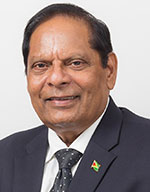I HAVE noticed faked figures being peddled by the opposition and sections of the media about the outcome of the November 12 local government elections as these relate to a partner of the APNU+AFC coalition government.
Those figures have been used to spin a fiction that the AFC secured only 4% of the total votes cast; that the PPP secured a landslide victory and is poised for an easy win at the next 2020 national elections.
The opposition is in desperation mode and is picking on this small party, as it knows that every single vote for the AFC consigns it eternally to the opposition benches in Parliament. Accepting but not admitting that the AFC did get 4% of total votes, that would be enough to make a difference.
The PPP fears that as an AFC political leader I could play a key role in making this difference. I expect that they would try all the dirty tricks in their bag to damage my image and to disrespect the office that I hold. They could do worse.
That was why they picked on Whim, the tiny fishing village where I was born on the Corentyne Coast. They boasted that the PPP has captured Whim; that the AFC received only a handful of votes, less that the number of persons who had supported the party candidates. They insisted that only the Nagamootoo “family cabal” voted for the AFC and that “Nagamootoo lost.”
HISTORIC IN-ROAD
At the 2016 Local Government Elections (LGEs), the APNU+AFC polled 31 votes in Whim. However, in 2018, the AFC independently contested two constituencies in Whim and secured a total of 62 votes. As against the 2016 coalition showing, the AFC alone polled a 100% increase. As a result, the AFC has made an historic in-road into a PPP base, and has breached what has been for it, since 1964, an Indian-dominated, ethnic fortress.
This is what discerning Guyanese, looking for an answer to ethnic polarisation, should celebrate; not the empty boast of the triumph of political tribalism.
In each of these two constituencies the votes secured by this small “third force” were greater than the 20 backers who supported the candidates. But the opposition and a few others who ought to know better, continued to pour scorn on the defiant and rebellious Whim voters.
By comparison, the AFC did not suffer the horrible defeat that was inflicted on the PPP in a Buxton constituency, where it failed to get a single vote! With 0 votes in Buxton, the PPP completely failed to show that it has multi-racial appeal, and that it could defeat the PNC on its African-dominated turf.
In the Buxton-Friendship constituency, the results were: 1,336 (APNU), 103 (AFC), and 000 (PPP).
The objective critics should compare and contrast Whim and Buxton, and examine which party has the greater potential, or even any semblance of popular appeal to impact Guyana’s ethnic and electoral problematic.
The opposition mis-applied figures to show that the AFC was decimated, that it has polled only 4% of total votes cast.
MULTIPLE CONSTITUENCIES
The fact of the matter is, the AFC contested full slates only in four municipalities – Georgetown, Linden, Mahdia and Mabaruma. It also fielded full slates in three NDCs – Bloomfield/Whim, Mocha-Arcadia and Diamond /Grove. This is what the total votes for these areas show:-
Total votes cast: 43,295. Of this number APNU polled 24, 881 or 57.46%; PPP – 13,106 or 30.27%; AFC – 4,964 or 11.40%.
Unlike general elections where the whole country is a single Proportional Representation (PR) constituency, the local authority elections have multiple, separate constituencies in town wards and villages.
In the general elections a vote for a party anywhere, is counted as a percentage of the total votes cast. But at local elections, the showing of any party would have to be computed as against the votes cast in the areas in which it contested.
I saw a Stabroek News article in which this approach was taken, when it showed that in 27 constituencies where the AFC contested, with and without full slates, it secured a total of 8,719 votes or 8% of total votes.
This would appear realistic when painted on a broader canvas; but the full effect of voting preferences is demonstrated when we examine areas where the contesting parties fielded full slates, as above.
I did not want to engage this issue, hoping that it would pass. But when the PPP took its boast and empty bombast into Parliament during the budget debate, I decided to nail their lies, as my silence did not mean surrender to these false and faked figures!
FAKED LANDSLIDE
One of the opposition MPs gave figures to show a 61% “landslide” for the PPP at the local polls. My figures show as follows:-
PPP — 122,307; APNU — 68,060; AFC — 8,719 and Others — 2,995, some of whom were independents whom the AFC backed.
Calculated against the 572,531 voters on the 2018 register, the PPP secured only 21% in an election it has described as a “referendum on the government”. It pleaded with its supporters to vote in order to throw the APNU+AFC out of government. As it turned out, it has failed to inspire or mobilise its own supporters. We now know that out of 572,531 persons on register, only 208,534 or 36% turned out.
The critics have used the outcome of the local government elections to put a wedge in the coalition. They must show that the AFC was weakened, or decimated.
But a study of the electoral fortunes of the AFC would show that it remains the most credible, genuinely authentic and consistently strong “third force” in Guyana. In the 2006 national elections, it polled 28,366 or 8.4% of the votes cast.
At the 2011 elections it received 35,555 or 10.32% of the 342,236 votes. For the 2018 municipal elections in the capital, Georgetown, where over close to one-half of the country’s voters reside, the AFC polled 3,059 or 10.75% of the 28,436 votes cast. In Whim, the AFC fought the PPP head-on and polled 13% of the votes.
This is no evidence that this party that has been decimated. It certainly is not “dead meat.”
THIRD FORCE
I know that there are some otherwise well-meaning persons who are disappointed with the performance of the AFC in government. They wish that the party should become more strident in getting specific things done.
This may be a good reason to occasionally badger this small force, but it needs all the support it could get to allow it to show that the political system in Guyana has space for a third force.
The AFC is important to keep this space open. Who knows, others may want to come in and, as I had said sometime in 2005, quoting Chairman Mao, even before the AFC was officially launched, “let a thousand flowers bloom.”
For now, the AFC is a fixture in government to push the development agenda and at the same time ensure that “Ali Baba and the 40 thieves” do not return to again plunder our national family treasures.



.jpg)








